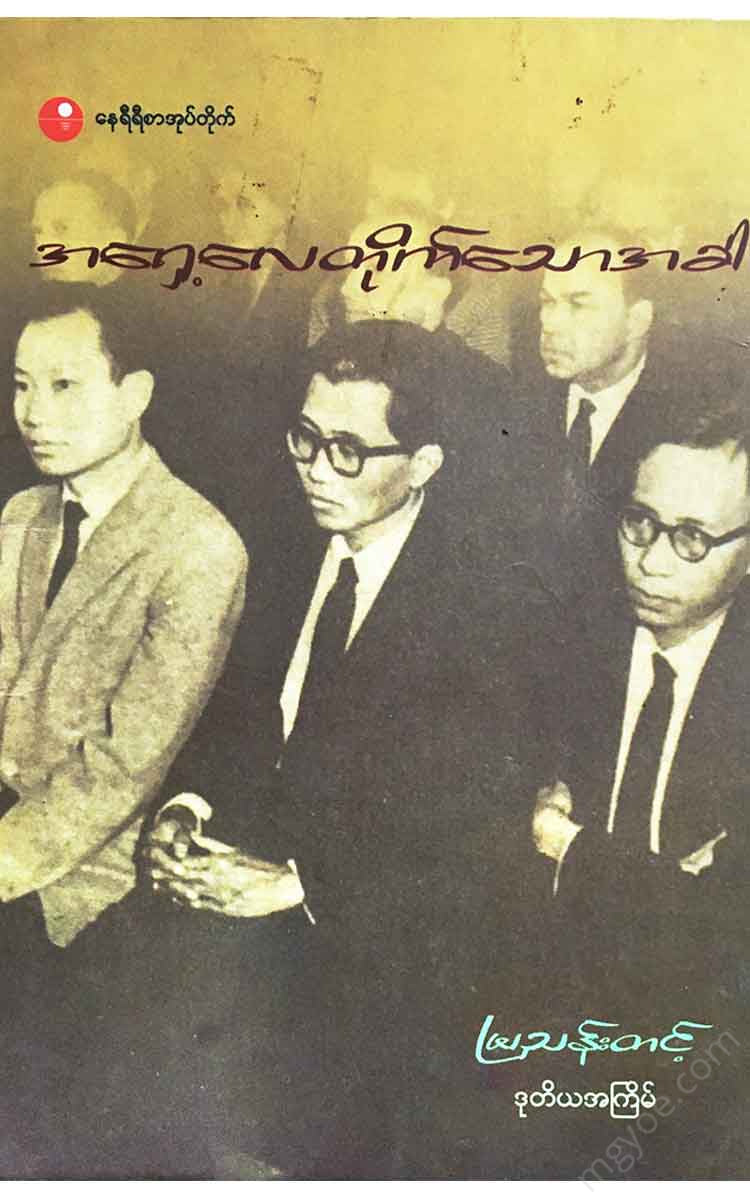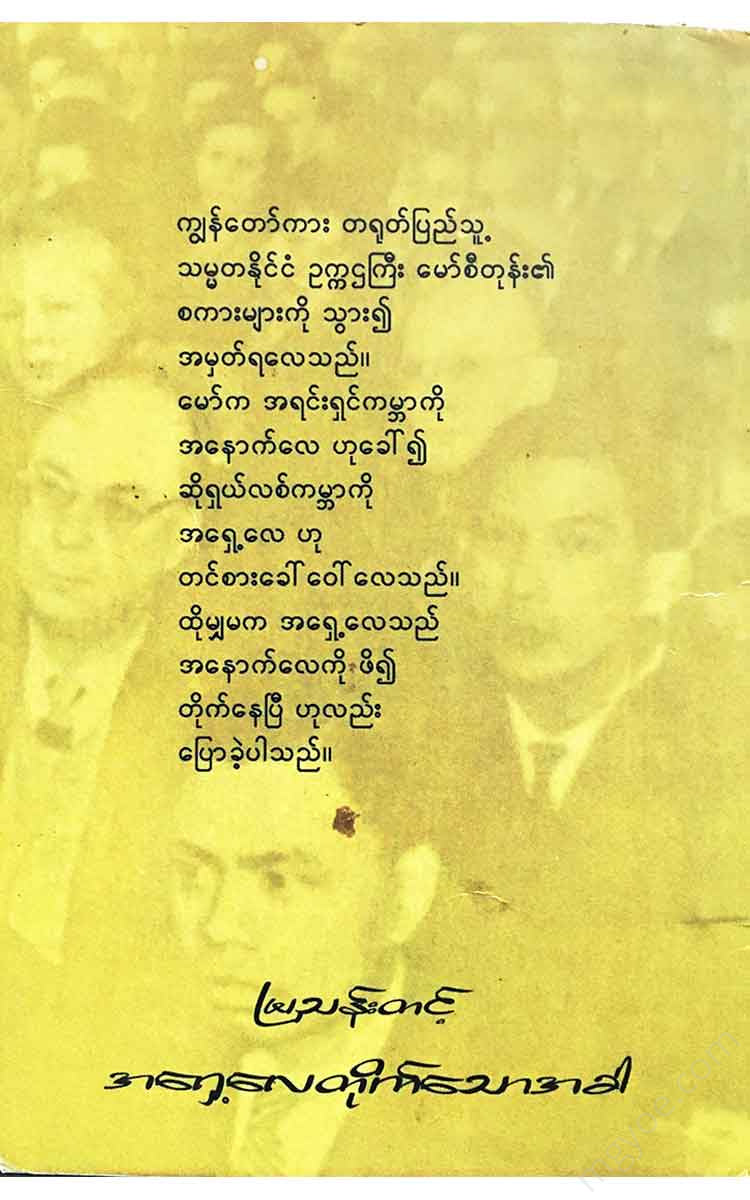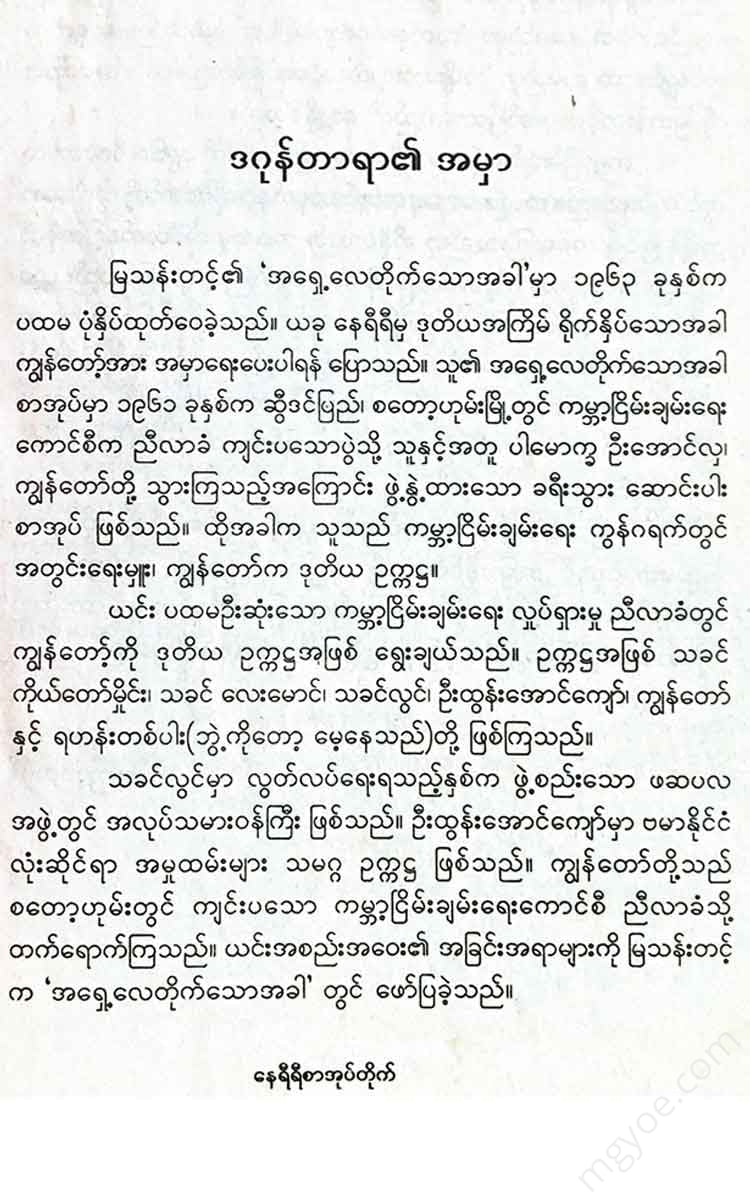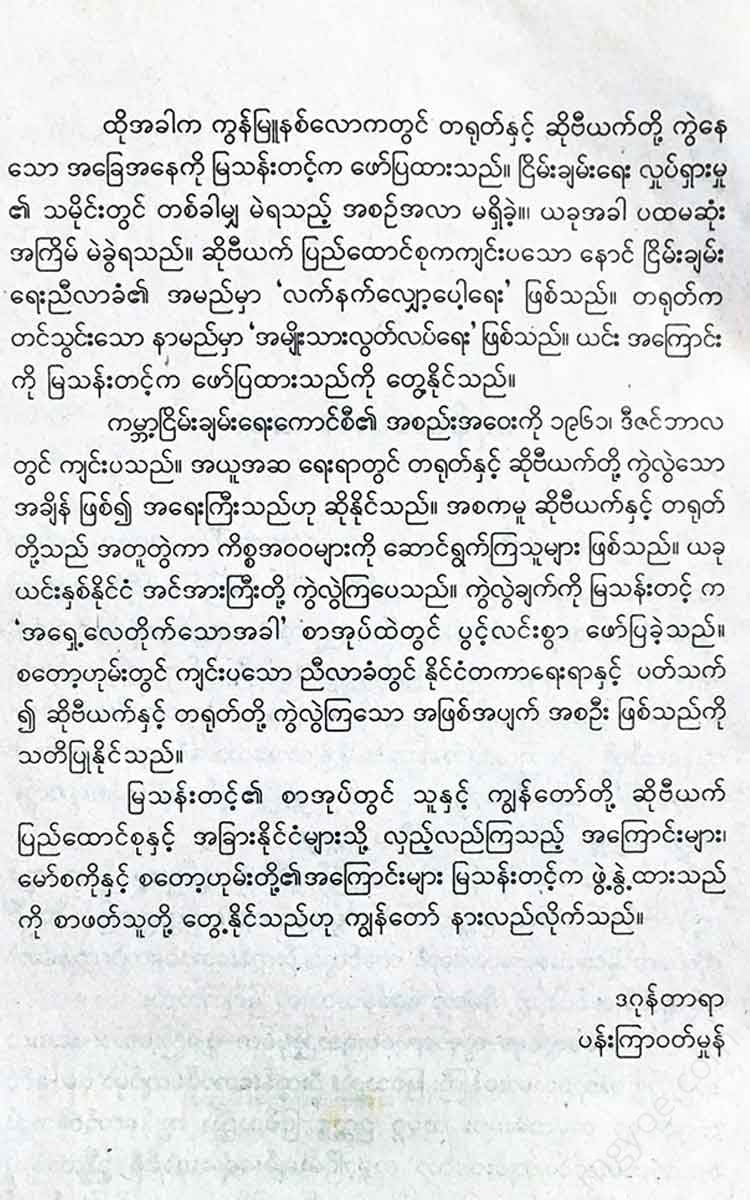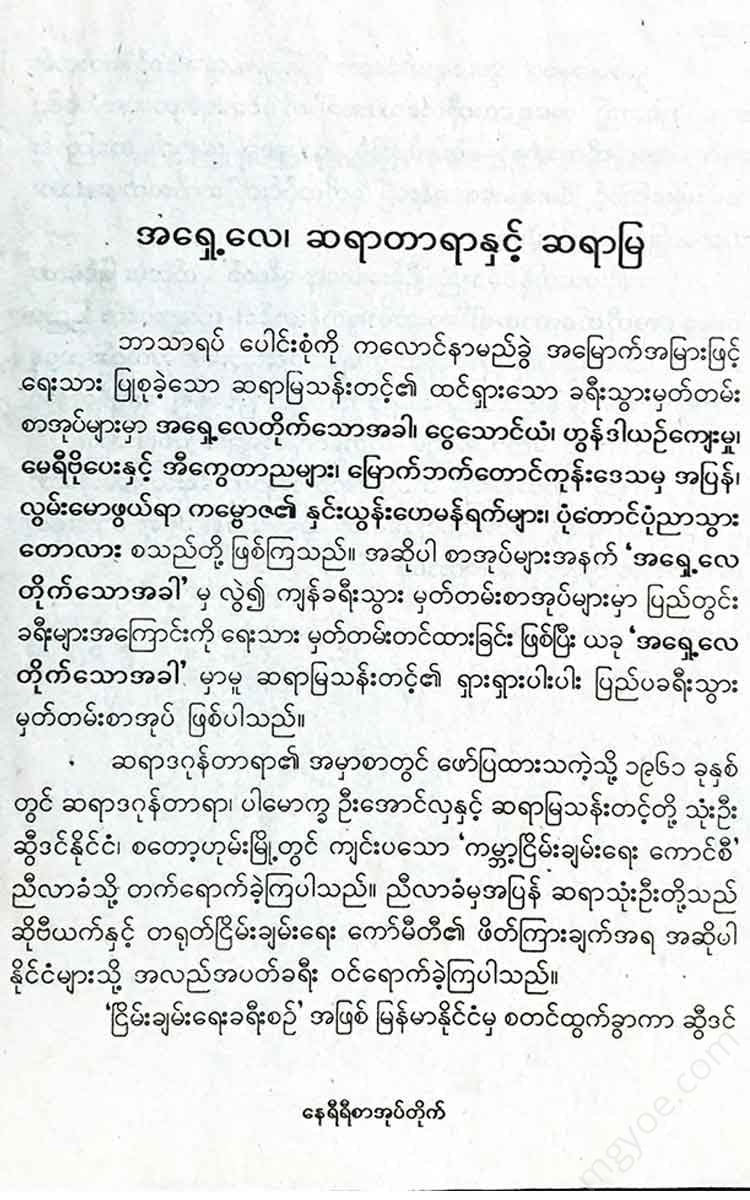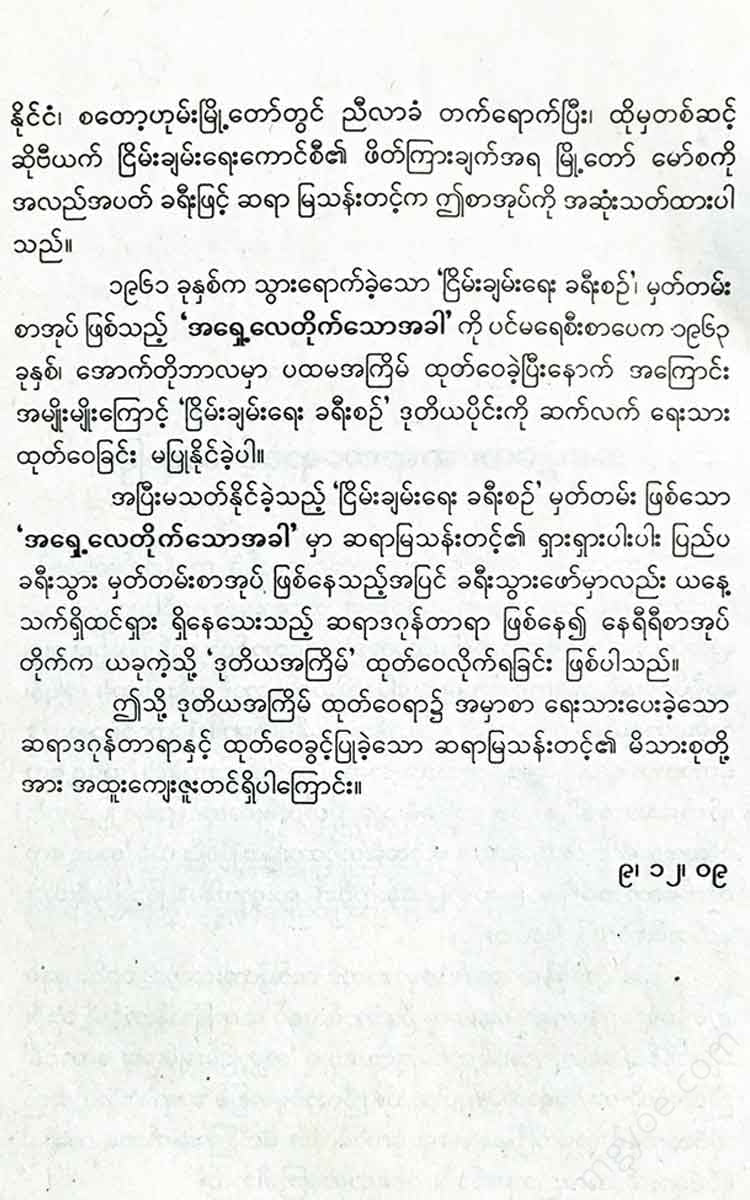Other Websites
Mya Than Tint - When the East Wind Blows
Mya Than Tint - When the East Wind Blows
Couldn't load pickup availability
“Please listen. Passengers bound for London, a large BOAC aircraft will be departing from Mingalardon Airport in a few minutes. Please be prepared.”
In the foreign airport building, the sounds of our conversations and greetings were muffled. Hearing the flight attendant's warning, we picked up our heavy, oversized coats and carried them in our arms. In one hand, we picked up our BOAC briefcase, which was filled with items for easy daily use.
The three of us, U Aung Hla, and Dagon Thara, were all ready and soon the flight attendant invited us to board the plane, so we followed her. We said goodbye to our family and friends who had come to say goodbye, and walked towards the large plane parked in the middle of the field.
It's starting to get dark outside.
“Hey, when you get to London, don’t forget to give the books I gave you to Teacher Hla.”
Kyaw Aung is trying not to forget that he gave books to Dr. Hla Pe, a professor at the University of London.
"Don't forget the letter I gave you to Luan Wai. If you don't have time to look for it, I'll send it to you from the post office."
Kyaw Aung warned me again. But I didn't have time to calmly answer him. I nodded my head and waved my hand, then walked slowly towards the plane.
The BOAC Comet jet was already starting up and running along the runway. It was taking off from the field and taking off. The lights and the buildings below were slowly fading into a blur. The plane was breaking through the clouds and climbing higher and higher. Finally, the clouds between us and the earth parted. It was 6:30 Myanmar time.
The plane was flying at an altitude of 30,000 feet. When it reached that height, the plane stopped. At the peak of its movement, it did not move up or down for a short time. If it did not move up or down, it would only think like this, I thought.
The three of us were sitting separately on the plane. There was an Englishman next to me. There was a Burmese woman next to U Aung Hla. Dagon Tara was sandwiched between the two Englishmen.
I looked down, trying to see the view. It was getting dark. And the clouds were high above, so I couldn't see anything. Then I took out my notebook from my bag and started flipping through it to remember what I had prepared for the conference.
We were leaving to attend the World Peace Council Conference in Stockholm, Sweden, so we had prepared well in advance the issues we would be discussing at the conference. During the cultural anniversaries organized by the World Peace Council, we submitted a proposal to celebrate the 200th anniversary of Minister Padayatra, so we had to study and note the literary and cultural qualities of Minister Padayatra so that we could present them at the council meeting.
At the time of the World Peace Council, international problems were emerging. In South Vietnam, the US imperialists were interfering with weapons and cooperating with the puppet government to suppress the country. The US imperialists were preparing to wage a war of aggression against Cuba. The Dutch imperialists continued to occupy West Irvine and obstruct the Indonesian people's struggle for freedom. In Algeria, the French imperialists were violently suppressing the Algerian people's struggle for freedom.
The NATO leaders have not only equipped West Germany with nuclear weapons, but are also preparing to invade the socialist bloc led by the Soviet Union. Not only this, but also in Angola, Goa, Congo, Laos, South Africa, Cameroon, Nigeria, Kenya, etc., as well as in Latin America such as Ecuador, Peru, the Dominican Republic, Puerto Rico, etc., the imperialists are destroying various people's liberation struggles. They are continuing to keep many countries under colonialism and are trying to bring many newly independent countries under new colonialism by means of armed violence. In this way, the imperialists are creating wars of aggression. As long as there are wars of aggression and colonialism, there will always be struggles of resistance by the oppressed people. As long as the imperialists try to come and rule unjustly and in various unjust ways, the oppressed people will always resist. The great socialist system and the socialist bloc led by the Soviet Union support the liberation struggle of the oppressed people. As long as the imperialists are waging wars of aggression, the socialist bloc will always support the oppressed people as long as they are fighting wars of resistance. Therefore, the danger of world war will always haunt us.
Therefore, world peace can only be achieved when the colonialists, who are the source of wars of aggression, are withdrawn from their colonies and sent back to their own countries. Once they have reached their own countries, their people, with the help of the people of the world, bury the colonialists and their system. This is possible only when all countries gain national independence.
Another important aspect of world peace is general and complete disarmament. The socialist bloc led by the Soviet Union has been working tirelessly both within and outside the United Nations for general and complete disarmament. It has the support of the peoples of the world. However, the imperialist countries led by the United States are preventing general and complete disarmament. Therefore, the World Peace Council Conference held in Delhi at the end of March 1961 adopted resolutions for (1) general and complete disarmament, and (2) the abolition of all forms of colonialism.
Only when these two problems can be solved simultaneously will there be any prospect of world peace. This is my belief.
The red light from the front of the plane flashed.
"Our plane is flying at an altitude of 32,000 feet. We will be landing at Delhi airport in 5 minutes. Passengers, please fasten your seat belts."
'The flight attendant's voice stirred the passengers. My thoughts were lost.
Mon Bo Kay, a cultural officer who had accompanied the delegation to attend the Asian Cultural Conference in Delhi, was packing his bags for departure.
It was 10:10 when we landed at the Delhi airport. It was a 3.5-hour flight from Yangon to Delhi.
The three of us entered the New Delhi Airport building. The New Delhi Airport building was not as grand as the Mingalardon Airport. It was quiet and dry, even though it was late at night. The shops selling Indian goods were also closed. Only a young woman and an old man were waiting at the entrance to the male and female toilets. In front of them were the coins given by those who had washed their hands.
There was nothing special to see at the airport, so they spent their time sitting in the lounge smoking. It was 11 o'clock before they left Delhi airport.
Dinner is served on the plane. BOAC flight dinner is very competitive. International airlines are competing with each other. They are trying to make the food and ceremony better than them. Not to mention the outside space, even the personal hygiene room is competitive. In the room, there are more than a dozen bottles of fragrant soap, perfume, hair lotion, powder, hand lotion, lip balm, eyelash curler, blush, body powder, foundation cream, etc.
I tried to sleep on the plane, but I couldn't. I could only think about world peace efforts.
The world peace movement is an international movement that gathers public opinion. The people of our country cherish world peace. However, world peace cannot be achieved by simply wishing for it. It can only be achieved by participating in the movement and fighting for it. The world peace movement needs to be expanded and developed in our country. Therefore, it was decided to call a Myanmar World Peace Congress, and a preparatory committee was formed three weeks before our arrival. The issues to be discussed at the conference were also determined. These are…
(1) Political, cultural, economic and scientific cooperation
Implementation problem.
(2) National independence and decolonization
the problem.
(3) The problem of general and complete disarmament.
(4) Organizational problems...etc.
